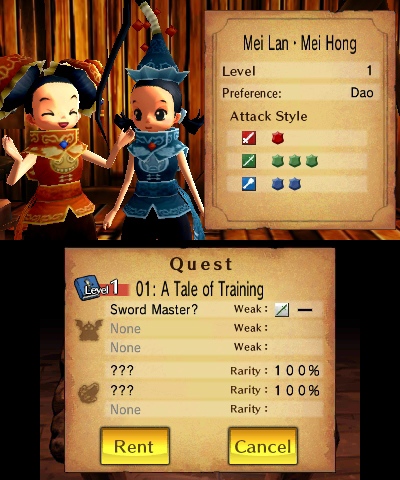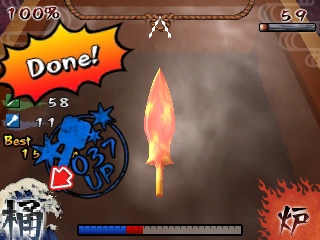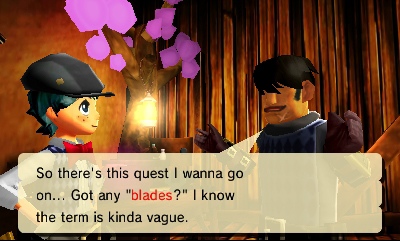Weapon Shop de Omasse is similar to a primetime sitcom. It takes a situation the audience is familiar with and follows characters with a different perspective on the world from the norm. Here the story follows a master and his apprentice as they manufacture weapons for customers in a town typical of one that could be found in any role playing game. Through comedy and blacksmithing, this duo attempts to gain a reputation with adventurers by crafting them weapons that fit their unique needs. Success, as it is in any business, is rated in how highly these customers speak of your wares. But like a sitcom, the game excessively needs to tell the audience when it thinks they should have a reaction while giving no feedback to what they should actually be paying attention to.
With the impending return of the Evil Lord, Weapon Shop’s main characters, master blacksmith Oyaji and his apprentice Yuuhan, open a weapon rental store to service the needs of the increasing adventurer population. Customers request weapons and based on what they’re fighting, their preferences, and the stores current inventory players are able craft them a weapon that gives the adventurer the highest chance to succeed. If they are successful, they will return with the weapon and pay for its use, but if they fail the weapon is lost and no payment is received.

In crafting, players mimic a rhythm established by Oyaji by tapping it on a molten piece of metal. Materials can be added to the metal before crafting, making the process easier or giving the weapon addition damage or special abilities. To get the best performance out of a finished weapon players must keep an eye on the heat of the metal while shaping it and making sure not to tap on the same spot twice. Crafting often seemed inconsistent and gave no real feedback as to how things affect the stats of a finished weapon. A perfect chain of matched rhythms sometimes yielded poor results in a weapon and a few missed beats seemed to have no effect on another.
Once a weapon has been crafted or it is returned to the store, it can be polished. Player’s wipe down the weapons model, making it shiny and giving it a small stats increase. It is beneficial to polish every weapon, but it often feels like a way to kill time in between orders for new weapons rather than a fun gameplay mechanic.

Weapon Shop is self described as a comedy and packs a laugh track behind character interactions to backup this notion. The game reads like a parody so an understanding of role playing games and what goes into them like town NPC’s and character sheets is needed to understand a large portion of the jokes. Customers can be hit or miss ranging from Sir Jean, a new adventurer who wants weapons modeled after the ones his favorite manga stars characters use to Captain Malibu, a female pirate who is trying to win the affections of a man she is obsessed with.
When customers are out adventuring, players can keep tabs on them through Grindcast. Grindcast acts like Twitter for adventurers and every weapon the player produces is fitted with a tracker that transmits to the service. Players can look at the feed to get the most out of each character’s story, but the feed continuously moves while crafting and polishing is going on.

Therein lies Weapon Shop’s biggest problem: time. Time is always working against the enjoyment of the player. Customers will come in and request weapons, which need to be made as quickly as possible because there is no indication as to when they would be returning for it. Some instances a character would return in about 5 minutes, when others would wait for close to an hour. For a portable game made to be played in short bursts, it’s easy to give away a weapon which was made for a specific character just because you forgot they haven’t yet come to claim it. It’s understandable that a game about running a store forces the player to balance the creation of products and social interaction, but too often it leans away from player enjoyment.
Weapon Shop de Omasse just seems off balance. It wants players to experience and laugh along with its story, but it overburdens with work. It wants the player to build the best weapons for customers, but doesn’t give feedback during production. It doesn’t help that when gameplay is paced well, it isn’t really all that fun after awhile. Timing, comedic and otherwise, forces this game to be more common then legendary.
This review is based on eShop code sent to SideQuesting by the publisher.


No Comments